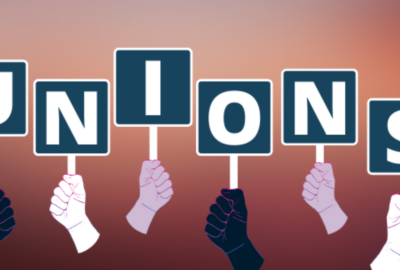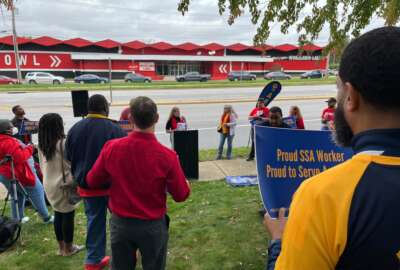This lawyer says public unions are not only wrong, they’re unconstitutional
Public employee unions are a fact of life at the federal and most state levels of government, and in many large cities.
Public employee unions are a fact of life at the federal and most state levels of government, and in many large cities. President John Kennedy famously authorized them at the federal level back in the early 1960s. Federal Drive with Tom Temin spoke with an author, who argues that public unions not only promote inefficiency, they’re also unconstitutional. Philip Howard is an attorney and founder of Common Good.
Interview Transcript:
Tom Temin And you have a new book out called Not Accountable Rethinking the Constitutionality of Public Employee Unions. And you seem to be making two arguments. One, that they don’t do the public very good, or operational efficiency and accountability of the government very good. And at the same time, they’re not even constitutional. Let’s start with the first argument, that they impede public efficiency and so forth.
Philip Howard Right. So what’s happened over the last 50 years, since collective bargaining was authorized, is that basic management tools have virtually disappeared. There’s near zero accountability at all levels of government in this country, and over 99% of federal employees get a fully successful rating. Why is that? Because if you say one negative thing and put it in the file through the supervisor, you’ve got a good chance of having to go through a grievance proceeding and nobody has the time to do that. So they’re near zero accountability and government has become substantially unmanageable. Basic decisions about who’s best doing what job can’t be made. There are strict rules on seniority and other kinds of restrictions on how management works. And so the result is the government is the public, it’s getting, well, lots of bad things. The public gets a fraction of what it pays for. Good public employees find themselves, sometimes in organizations which are dispirited. Paul Volcker wrote about this, because it’s unmanageable and there’s no mutual trust that everybody’s pulling their share and that sort of thing.
Tom Temin And one irony that you point out pretty early in the book is that some of the establishment of public unions, this is mainly in the municipal level, was precisely to get rid of the patronage type of system, which was never efficient or fair in favor of a professional civil service. You cite Mayor Wagner (D-N.Y.), although Tammany Hall was kind of dead 30 years before that.
Philip Howard Yeah, the history of this is ironic. We wanted to get rid of patronage, which we started doing back in the late 19th century and the Progressive Era, that was a good thing. But it gave rise to a natural organizing group of semi-permanent public employees, who then kind of naturally wanted sort of more power. And over the years, the leaders of these public employee associations wanted to get similar powers as trade unions. And FDR resisted it and LaGuardia resisted it. But finally, during the rice revolution of the sixties, they went along and gave them these powers, and they didn’t really understand that there’s a substantial difference between private bargaining and trade union bargaining, both in the dynamics of the negotiation, and also in what you can bargain for. And so the result is that controls that would never be seen in a private union contract. You could never get rid of accountability in a car factory, because the assembly line wouldn’t work and the other workers wouldn’t do it. But that’s just the state of nature in the public sector.
Tom Temin And what about the differences between federal and all other public unions? Because federal cannot bargain for pay and benefits. How has that changed the dynamic between the two basic categories?
Philip Howard Well, I think it does change the dynamic somewhat. I mean, the state and local unions have negotiated for really unaffordable long-term pensions and free health care benefits and such, that it’s not such a problem in the federal sector. So I would say it’s less of a problem in the federal government. But one of the big supporters for overhauling civil service and Senior executives association, because they feel that they don’t have adequate managerial control. And so, what I’m calling for in the federal government, I’m talking to some presidential candidates about this, it’s really a remaking of the civil service system back to what it was originally intended to be, which is a merit system with speed bumps to protect against arbitrary dismissal or somebody like Donald Trump coming in and wielding an ax. We don’t want that. But not a trial like hearing every time somebody puts a negative comment in an employee file.
Tom Temin We’re speaking with attorney Phillip Howard. He’s author of Not Accountable, just out from Rodin Books. And about the question of constitutionality. Your thesis is that, because they are so entrenched, federal unions cannot be dislodged except by a constitutional challenge.
Philip Howard I mean, that’s the practical effect. But, no one had really ever analyzed public employee unions through the lens of constitutional governance. So democracy is nothing but a process of accountability. You elect someone. Particularly, you elect an executive like a president, a mayor or governor, and their job is to manage the operating machinery of government. And if they do a bad job, the voters will elect someone else or elect a new party. And what’s happened is the public union agreements have effectively taken away their managerial powers. So you elect people who are figureheads. And so democracy can’t work. And so I argue in the book that these collective bargaining agreements and controls should be unconstitutional, because democracy can only work when the mayor actually has the authority to reorganize a failing school, for example.
Tom Temin And how does that come about? In other words, you need a case to render something unconstitutional.
Philip Howard Yeah. So we’re working with several public interest law firms in a number of states about organizing challenges under, what’s called the guarantee clause of the Constitution, which basically says the U.S. Constitution guarantees a Republican form of government. Which means that the people who get elected have to retain their authority to run government. They can’t give it to any private group. There’s a lot of stuff by Madison. But in the federal government it could actually be overhauled, I believe, by executive order, by the president, who would simply say, I believe that parts of the Civil Service Reform Act 1978 that require collective bargaining and require all the detailed provisions for any discipline or termination are unconstitutional under Article two, which gives me executive power, and there’s a lot of authority in Supreme Court on that. And therefore, by executive order, I’m creating a new civil service system that makes it easier to fire much more easy to get rid of non-performing employees. And I’ll have speed bumps to make sure that people are not treated arbitrarily or for partizan reasons. But this is going to be what I’m proposing. And then, of course, his executive order would be challenged either by the unions or among other things. And so it would go to the Supreme Court, and the Supreme Court would decide.
Tom Temin I mean, in some ways, isn’t that what the Trump administration tried to do?
Philip Howard They did this Schedule F. I believe they had the authority to do schedule F, which basically created at will employment for 3,000 or so top federal officials. But I didn’t like it, because I thought it should have speed bumps to guard against Partizan or arbitrary dismissals. So I thought there needed to be some independent body that’s there to make sure that people weren’t treated unfairly. Because I think, ultimately, what you want are organizations that are trustworthy. You want people who work in the government to feel that they’ll be treated fairly, then they’ll work hard and stuff. And so just as having no accountability would remove trust, so too having arbitrary dismissals, removing trust. You need something in the middle.
Tom Temin It’s always incumbent on management to be well qualified and operate in a correct way.
Philip Howard Yeah, that’s right. So everybody should be accountable. And again, there should be protections so that people don’t fear that they’ll show up one day and all of a sudden they’ll be out on the streets. So in my world, this new executive order with a new civil service system would include many of the reforms that people like the Partnership for Public Service have been advocating, but it would do it by executive order.
Tom Temin All right. And what’s the reaction to the book so far?
Philip Howard I mean, I’ve written broadly about, not about unions, but about the functioning of government and over bureaucratization, all that kind of stuff. My book, The Death of Common Sense, was a big bestseller. And I work with Clinton and Gore back in the nineties. But I’ve had more reviews on this book than any book have ever written. I mean, it’s just unbelievable. But the liberal media hasn’t criticized it, it just ignored it. The New York Times, basically said nothing. And I’m just now starting to get commentary long article in Government executive magazine by Don Kettl, just came out, talking about how this is likely to be one of the battle lines in the 2024 election. Which is, how do we manage government? So I think it is an issue whose time has come.
Copyright © 2024 Federal News Network. All rights reserved. This website is not intended for users located within the European Economic Area.
Tom Temin is host of the Federal Drive and has been providing insight on federal technology and management issues for more than 30 years.
Follow @tteminWFED





